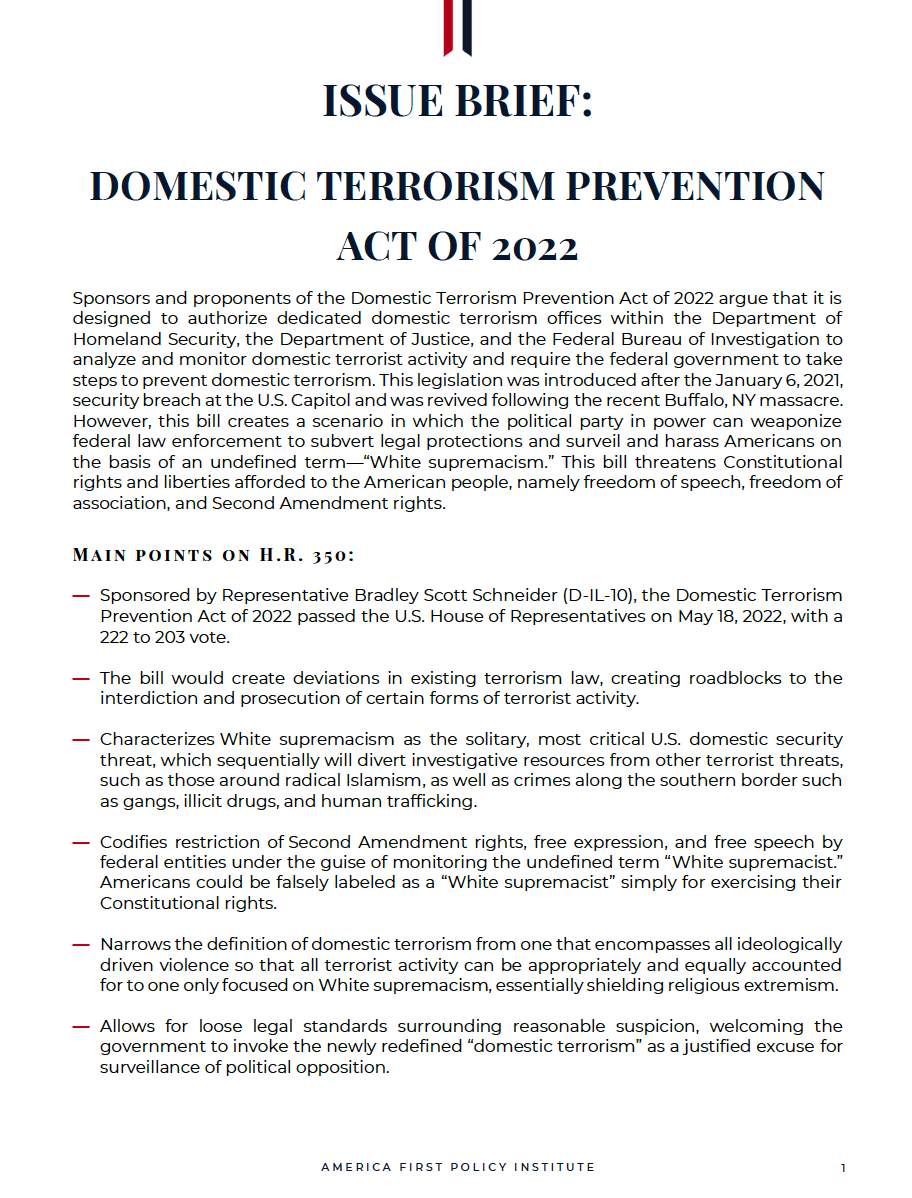Issue Brief: Domestic Terrorism Prevention Act of 2022
Sponsors and proponents of the Domestic Terrorism Prevention Act of 2022 argue that it is designed to authorize dedicated domestic terrorism offices within the Department of Homeland Security, the Department of Justice, and the Federal Bureau of Investigation to analyze and monitor domestic terrorist activity and require the federal government to take steps to prevent domestic terrorism. This legislation was introduced after the January 6, 2021, security breach at the U.S. Capitol and was revived following the recent Buffalo, NY massacre. However, this bill creates a scenario in which the political party in power can weaponize federal law enforcement to subvert legal protections and surveil and harass Americans on the basis of an undefined term—“White supremacism.” This bill threatens Constitutional rights and liberties afforded to the American people, namely freedom of speech, freedom of association, and Second Amendment rights.
Main points on H.R. 350:
- Sponsored by Representative Bradley Scott Schneider (D-IL-10), the Domestic Terrorism Prevention Act of 2022 passed the U.S. House of Representatives on May 18, 2022, with a 222 to 203 vote.
- The bill would create deviations in existing terrorism law, creating roadblocks to the interdiction and prosecution of certain forms of terrorist activity.
- Characterizes White supremacism as the solitary, most critical U.S. domestic security threat, which sequentially will divert investigative resources from other terrorist threats, such as those around radical Islamism, as well as crimes along the southern border such as gangs, illicit drugs, and human trafficking.
- Codifies restriction of Second Amendment rights, free expression, and free speech by federal entities under the guise of monitoring the undefined term “White supremacist.” Americans could be falsely labeled as a “White supremacist” simply for exercising their Constitutional rights.
- Narrows the definition of domestic terrorism from one that encompasses all ideologically driven violence so that all terrorist activity can be appropriately and equally accounted for to one only focused on White supremacism, essentially shielding religious extremism.
- Allows for loose legal standards surrounding reasonable suspicion, welcoming the government to invoke the newly redefined “domestic terrorism” as a justified excuse for surveillance of political opposition.
- Establishes new training and screening for current agencies focused on signs of White supremacists (and those subcomponents that will be created) based on suspected signs of domestic terrorism. The stated purpose is to prevent law enforcement agency infiltration of White supremacists.
- Undermines investigative collaboration between federal, state, and local law enforcement agencies working together to identify and prevent violent acts by confirmed terrorist groups.
PROBLEMATIC POLICY PROVISIONS IN THE BILL:
Regardless of the framing, the Domestic Terrorism Prevention Act is a politically driven strategy that serves as a distraction from combating more immediate and probable national security threats.
- The proposed legislation does not define the terms “White supremacist” or “White supremacism,” which are used 13 times throughout the bill. This leaves the terms open to broad interpretation, which can be driven by political motives and threatens the rights and liberties of Americans.
- Federal and state law enforcement agencies already have the necessary authority to monitor and interdict suspected terrorists, despite the premise of this bill that they do not.
- Experts agree that this bill would create exceptions to what is and is not considered criminal acts of terrorism. These exceptions would create scenarios in which defendants would not be able to offer a valid defense in a court of law due to the vagueness of the definitions.
- Investigative resources would be diverted from other terrorist threats, both domestic and foreign, ignoring groups like Antifa or ISIS, neither of which are mentioned in the bill. This comes at a time when there are active threats against former presidents of the United States and only 2 years removed from the most costly and deadly summer of violent protests in more than 50 years.
- The Courts have acknowledged that “domestic terrorism” is inevitably and intricately intertwined with constitutionally protected dissent and association. This bill does nothing to draw clear lines but rather blurs them further. This would open the door for likely surveillance of political opposition without first establishing reasonable suspicion—for instance, the recent threat tags placed on parents who spoke out against certain school board decisions.
- The proposed “Domestic Terrorism Executive Committee,” as well as the training efforts called for in this bill, would focus solely on “White supremacism,” leaving a gap in response capability to other domestic terrorism threats.
- Some believe that the requirement to “report” the number of White supremacism cases investigated annually would cause law enforcement to unnecessarily and inappropriately open new cases simply for the sake of reporting numbers.
Bill Woolf serves as a Senior Fellow for the America First Policy Institute (AFPI).
